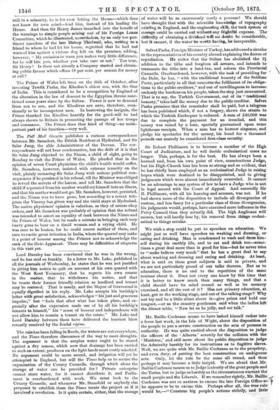Sir Robert Phillimore is to become a member of the
nigh Court of Judicature, and he will decide ecclesiastical cases no longer. This, perhaps, is for the best He has always been a learned and, from his own point of view, conscientious Judge, but his High-Church bias has been so strong and so evident, that he has chiefly been employed as an ecclesiastical Judge in raising' hopes which were destined to be disappointed, and in giving- judgments which were almost immediately overruled. It cannot be an advantage to any system of law to have a Judge who is not in legal accord with the Court of Appeal. And assuredly Sir R. Phillimore, with all his learning and acumen, was not. If he had shown more of the disposition to include all divergencies of custom, and less fancy for a particular class of those divergencies, his judgments would, perhaps, have exercised more influence in the Privy Council than they actually did. The high Anglicans will mourn, but will hardly lose by, his removal from things ecclesi- astical to things secular.


































 Previous page
Previous page